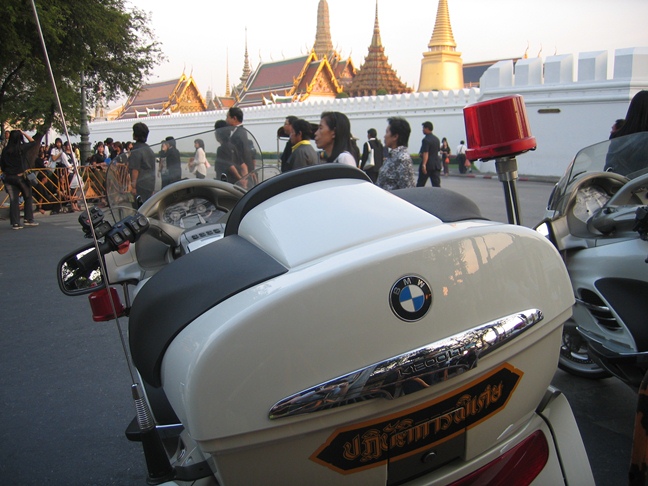I am researching how the Thai monarch is semiotically positioned to represent the hegemonic Thai discourse of ‘unity’, through the multifaceted ways in which conformity is encouraged and open dissent is marginalized. The role of the state in inculculating the masses with a unitary form of Thainess — primarily through the education system and media — does not need to be explained to readers of New Mandala, nor does the role of the lese majeste in stifling overt displays of resistance. However, an interesting angle to consider is how seemingly independent groups like ‘Social Sanction’ orchestrate witch hunts by exposing as ‘red shirts’ those who do not display appropriate ‘Thainess’.
The Social Sanction Facebook group has over 20,000 members and ‘publishes the addresses and phone numbers of red-shirt opponents accused of defaming the Thai monarchy’. Recent cyber witch hunts have resulted in the lese majeste charge brought against ‘Joss Stick’ for her Facebook postings, and the violent attack on Nitirat member Worachet Pakeerut. Furthermore, it seems that one’s career success may also be built on showing the appropriate level of reverence. An obvious example is that of Mark from the ‘AF’ reality TV program, who was hounded off the show in 2010 after making Facebook comments criticizing royalist Prime Minister Abhisit Vejjajiva and, perhaps more provocatively, asking “…when will the picture be taken down from all the houses?”. Upon quitting the show Mark contritely apologized, calling for his fellow Thais to ‘put aside our political differences and unite for the pleasure of the King’, thus toeing the party line and, presumably, attempting to minimize the harm done to his career by standing out.
Another celebrity accused of red shirtery in 2010 was Bird Thongchai McIntyre, who was listed on a Facebook site dedicated to ‘condemning’ red celebrities. These accusations perhaps motivated him to insist, “I have no color, and I am loyal to the King”. In this context, it is perhaps unsurprising that Bird has chosen to involve himself in a new Thai cartoon, ‘in the footsteps of the king’, which will teach Thai children to ‘appreciate the King’s duties’. Irrespective of his true beliefs, it is a wise career move to position himself behind the patriarch as a way to avoid accusations of disloyalty. Presumably, if offered such a role, it would be imprudent to reject.
While these high profile cases receive plenty of media attention, another interesting angle to consider is how the politics of loyalty play out in the workplace. It would probably be unwise to overtly display opposing symbols, such as pictures of the Shinawatra clan; but what motivates somebody to decorate their office desk with images of the monarch? Could it be that they are seeking inspiration to get through the day, perhaps in the way that images of Mary are used by Catholics? Or, could it be that such overt displays of conformity are necessary to rise the corporate ladder in these times when suspicions are running high? I have no definitive answer to this question yet, but would very much appreciate any comments.
The history of witch hunting, both literal and metaphorical, has always been based on attempts to enforce conformity to the viewpoints of the dominant political class. This was equally true of the dark age era Catholic Church-inspired persecution of unmarried, rural women selling medicinal herbs, aka ‘witches’; the McCarthyist era’s attempts to stop the social democratic movements happening in Europe from spreading to the US; and the Russian Communist party’s institutionalizing/gulaging of political opponents. The purpose of witch hunts is to instill a singular hegemonic worldview, and those punished are usually guilty of little more than having different ideas to the dominant group. With the increasing rise of political consciousness in the countryside, it will be interesting to see if a more pluralized version of ‘Thainess’ emerges in the coming years once it is no longer possible to claim the need for unity under the semiotic figurehead. In the meantime, don’t stand out.
 Facebook
Facebook  Twitter
Twitter  Soundcloud
Soundcloud  Youtube
Youtube  Rss
Rss 